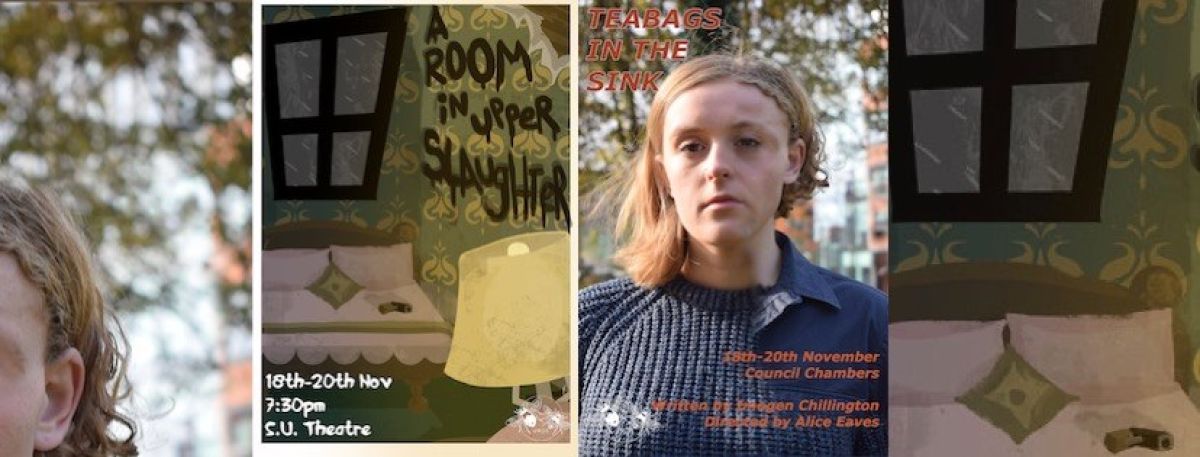Review: Teabags in the Sink and A Room in Upper Slaughter

As part of their experimental Autumn Fringe, the Drama Society put on two short plays written by students, back to back.
The first of these was Teabags in the Sink by Imogen Chillington, directed by Alice Eaves. The play concerned a normal family of four. Their domestic dramas were narrated to us by sardonic teenager daughter Billie (Maddie Webster-Harris).
As the name suggests, the play featured recognizable aspects of middle class life; the parents argued over whether they would make “chickpea surprise” or a stir-fry for dinner, the hungover older daughter wandered downstairs to fix herself a snack before disappearing to watch another episode on Netflix, the father hummed The Archers theme tune.
Lerato Mokate’s design was the highlight of the play. Projected onto a back screen were photos of a kitchen which had cute animations superimposed on top of them.
The show was performed in a cramped space that could barely contain the four actors, to illustrate the pressures of living in such a home. But the problem with this configuration was that if you were not in the front row (and I was in the back row) it was very difficult to see what was taking place, especially because for much of the play, Billie was seated on the floor.
I was sad as well to miss out on many of the creative animations projected onto the screen because of the angle I was facing the stage at.
The directors can be congratulated for finding a cast who actually looked like a family. The mother (Olivia Downing) resembled older daughter Emily (Josephine Rogers) and the likeness between Webster-Harris and Monty Ashley as the father was remarkable. It was so remarkable in fact that after leaving the show, I realized that the poster for the show was a photo of their two faces merged together and I had not even noticed because they looked so similar.
There seemed to be a subtext in the play about mental health and running with this message, I think Teabags in the Sink could be extended into a full length play, packed with more bad dad jokes and sisterly bickering.
After a break, we were welcomed into an entirely new stage space for A Room in Upper Slaughter by Lara Biller, directed by Sofia Armella and Mariella Dyckhoff.
Two assassins lay in wait in a hotel room, sucking on lollipops as a thunderstorm boomed outside. These two women were menacing, apathetic Florence (Daisy Shuttleworth) and nervous, fidgety Ash (Lauren Owen).
While waiting for their target to arrive, they were plagued by obsessive phone calls from Ash’s ex-girlfriend Greta (May Brittenden). Gay female assassins? I was sold!
The tension was high throughout with two such opposing personalities placed in a room together. The suspense in the room was palpable when Greta herself showed up at the hotel despite the location supposedly being top secret. Every moment of this play was gripping as we were left baffled for what would occur next.
Shuttleworth and Owen were the driving forces of the play. With slow, confident movements, Shuttleworth brought across a woman who was not to be messed with, whom we felt threatened by even sitting safely in the audience.
Owen’s on the other hand was a highly emotive, tender performance. She paced and anxiously bit her nails and delivered a powerful monologue about how in love she and Greta had been. The two actresses had great chemistry together, as did Owen and Brittenden who did not even have to make physical contact with each other to show how deeply Ash and Greta cared for each other.
Dyckhoff and Armella also choreographed an effective fight sequence which all the performers put high energy into.
Despite being a play about murder, the script was packed with witty one-liners. “You look like a ninja,” Florence said to Ash, as Ash put on a hotel staff uniform as a disguise. Later, Ash blurted out explicit details of hers and Greta’s sex life while Florence uncomfortably looked on. The dialogue felt natural while still allowing for a play that explored a topic which is out of the ordinary.
In a hilarious twist, their male target, the driving force of the action and the reason the three women were gathered there that night, was a very small role. This was a wonderfully feminist inversion of tropes in the spy genre where one-dimensional female characters are often killed off to further the leading man’s narrative arc. Suddenly, this voiceless male character became a canvas to tell a female-driven queer love story.
The only aspect I was at all disappointed by was the ending. In a play with such twists and turns, that always kept us wondering what would occur next, the last moments to me felt predictable.
Without giving too much away, there seemed an awareness in the writing of the ‘Bury Your Gays’ trope, where LGBTQ characters are killed at disproportionately high rates in the media. There was an attempt to avoid this trope while also trying not to give the piece a neat, happy ending.
As a result, the ending was left ambiguous which just felt like an attempt to satisfy everyone in the audience rather than for the author to provide her own voice on the matter. Nevertheless, I can imagine seeing this play again in the future on a professional stage and I look forward to that day.







